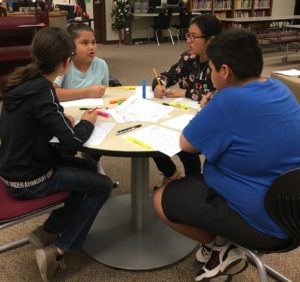Perfect program to prepare for college and careers
Among all the other academic competitions out there, Future Problem Solving stands out in its ability to teach critical thinking, problem solving and creativity. The skills are not only taught, but they are practiced and refined in a hands on learning situation. So many colleges and careers are looking for students that are able to work in a team setting to not only identify underlying problems but develop solution ideas that can tackle these issues.
Skills Fostered through Future Problem Solving:
- Researching and Information Gathering– Students learn to analyze and evaluate information from a wide variety of sources.
- Critical Thinking and Problem Solving– Students use analysis to gain an understanding of issues in today’s world, and to understand the significant aspects of complex situations set in the future. Problem solving skills are used as the participants work through solutions and action plans for those situations.
- Cross Division/Category Implication Development- Students brainstorm how a situation creates issues within other categories/divisions. This broadens their ability to look at situations from a variety of perspectives.
- Creativity and Innovation- Students learn to think “Outside of the Box.” Creativity is essential as the students generate challenges and develop multiple ideas for solutions to pressing global issues. Problem solving situations are set in the future to encourage inventive thinking.
- Evaluation and Decision Making- Students develop criteria to evaluate possible solution ideas and utilize an evaluation process to determine the best solution.
- Communication and Collaboration- Students collaborate in teams while learning about the issues and applying their problem solving skills. Clear and articulate communication is developed while working with team members, as well as through written documents submitted for evaluation.


how to get a student involved:
Many schools in the state of Texas have FPS, however, if you are a student or a parent of a student in a school without FPS, there are several options of how to join FPS:
- Start a club at your school: Many students have created clubs at their school for FPS. This is a great way to get involved since you can also get other students to join you. PLUS, as the club organizer, you are able to put on your resume that you spearheaded a club to teach critical thinking and problem solving at your school. In order to do this, you will most likely need to find a teacher to sponsor your club. English/Literature teachers or Gifted/Talented instructors are a great option.
- Register as an individual: Students are able to compete as an individual in all the competitions if they would. We have also had many parents register teams of friends or neighbors. Students and/or parents can take the trainings over the summer or can reach out to the State Director for assistance.
